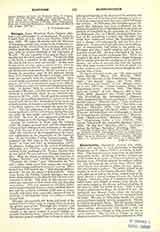

Kleutgen, JOSEF WILHELM KARL, German theologian and philosopher, b. at Dortmund, Westphalia, April 9, 1811; d. at St. Anton near Kaltern, Tyrol, January 13, 1883. He began his studies with the intention of becoming a priest, but, owing to the Protestant atmosphere of the school which he attended, his zeal for religion gradually cooled. From April 28, 1830, to January 8, 1831, he studied philology at the University of Munich. He was intensely interested in Plato’s philosophy and the Greek tragic poets. Though he clung to the Faith, it ceased to be the ruling principle of his life, and he fell into a deep melancholy. In this state he was about to enter upon a secular career, when he suddenly received what he always regarded as a special illumination from heaven. Still he was not at rest. During the preceding years he had imbibed certain ideas from Lessing’s and Herder‘s writings, which he could not reconcile with the Christian Faith. After several weeks of internal conflict he betook himself to prayer, and to his astonishment many of his difficulties vanished at once; the remainder disappeared gradually. At Easter, 1832, he entered the theological academy of Munster, and after two terms went to the seminary at Paderborn, where he was ordained sub-deacon on February 22, 1834. On April 28 he entered the Society of Jesus at Brig, Switzerland, and, to avoid any trouble with the German Government in the matter of military service, he became a naturalized citizen in one of the Swiss cantons, and changed his name to “Peters”. After his ordination to the priesthood in 1837 he was professor of ethics in Fribourg, Switzerland, for two years; he then taught rhetoric in Brig from 1840 till 1843. In 1843 he was appointed professor of sacred eloquence in the German College, Rome.
During his residence in Rome and the vicinity (1843-74), besides pastoral work and the composition of his principal writings, he was substitute to the secretary of the General of the Jesuits (1843-56), secretary (1856-62), consultor of the Congregation of the Index, and collaborator in the preparation of the Constitution “De fide Catholica” of the Vatican Council. He composed the first draft of the Encyclical “Aeterni Patris” of Pope Leo XIII on Scholasticism (1879). He played a leading part in the revival of Scholastic philosophy and theology, and so thorough was his mastery of the teachings of St. Thomas Aquinas that he was called Thomas redivivus (Thomas returned to life). With the object of combating the doctrines of Hermes, Hirscher, and Gunther, he composed his “Theologie der Vorzeit” and “Philosophic der Vorzeit”, works which upon their appearance were pronounced in many quarters to be epoch-making. When he died, Leo XIII said of him: “Erat princeps philosophorum” (he was the prince of philosophers). Some years before the Vatican Council Kleutgen was confessor extraordinary to the Benedictine Convent of St. Ambrose in Rome. The nuns of this convent honored as a saint one of their sisters who had died fifty years before. This was reported to the Holy Office, and everyone concerned was severely punished; Kleutgen and the ordinary confessor (both men of exceptionally holy lives) were suspended, because of lack of prudence in directing the nuns, for awhile even from saying Mass.
Kleutgen consequently left Rome and went to the secluded shrine of Our Lady in Galoro, where he wrote the greater part of his “Theologie der Vorzeit” and “Philosophie der Vorzeit”. After the opening of the council, at the urgent request of several bishops, especially Archbishop Stein, Apostolic Vicar of Calcutta, his superior general recalled him to Rome to place histalents and learning at the disposal of the council, and Pius IX removed all ecclesiastical censures as soon as he became acquainted with the work which Kleutgen had written. In 1879 some Old Catholics spread the report that Kleutgen had been condemned by the Roman Inquisition to an imprisonment of six years on account of complicity in the poisoning of a Princess von Hohenlohe; but, on March 7, Juvenal Pelami, Notary of the Inquisition, testified that Kleutgen had never been summoned before the Inquisition upon such a charge, and consequently had not been punished by it. Possessed of high gifts and vast erudition, and, in consequence, very much in the public eye, Kleutgen was also a model religious and a man of austerely simple life. He was very fond of the poor, and they in turn almost worshipped him. When he preached, his plain, straightforward, simple language had an appeal even for the intelligence of the most illiterate; and when in conversation with the learned, who often came to consult him, his flow of speech was as free, copious, and unembarrassed as though he were reading from a book.
Kleutgen’s principal works are: “Die alten and die neuen Schulen” (Mainz, 1846; Munster, 1869); “Ueber den Glauben an das Wunderbare” (Munster, 1846); “Ars dicendi” (Rome, 1847; Turin, 1903); “Die Theologie der Vorzeit” (3 vols., Munster, 1853-60; 5 vols., 1867-74); “Leben frommer Diener and Dienerinnen Gottes” (Munster, 1869); “Die Philosophie der Vorzeit” (2 vols., Munster, 1860-3; Innsbruck, 1878), translated into French and Italian; “Die Verurteilung des Ontologismus” (Munster, 1868), translated into French and Italian; “Zu meiner Rechtfertigung” (Munster, 1868); “Vona intellectus agens and den angeborenen Ideen”, “Zur Lehre vom Glauben” (Munster, 1875); “Die Ideale and ihre wahre Verwirklichung” (Frankfurt, 1868); “Ueber die Wunsche, Befurchtungen and Hoffnungen in Betreff der bevorstehenden Kirchenversammlung” (Munster, 1869); “Briefe aus Rom” (Munster, 1869); “Predigten” (Regensburg, 1872; 2 vols., 1880-5); “Die oberste Lehrgewalt des romischen Bischofs” (Trier, 1870); “De ipso Deo” (Ratisbon, 1881); “Das Evangelium des heiligen Matthaus” (Freiburg, 1882).
JOHN J. TOOHEY

